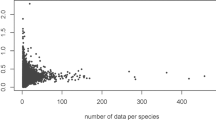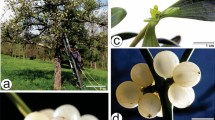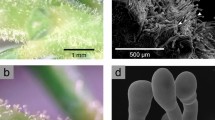Abstract
THERE are numerous instances where a genus or other group of plants is characterized by particular chemical constituents. In the Eucalypts, for example, chemical evidence has been of value in some instances in determining specific differences, while in Pinus, Erdtman and co-workers1 have recently shown the presence of a characteristic pattern of heartwood constituents.
This is a preview of subscription content, access via your institution
Access options
Subscribe to this journal
Receive 51 print issues and online access
$199.00 per year
only $3.90 per issue
Buy this article
- Purchase on Springer Link
- Instant access to full article PDF
Prices may be subject to local taxes which are calculated during checkout
Similar content being viewed by others
References
See Linstedt, Acta Chem. Scand., 5, 129 (1951).
Brandt and Thomas (unpublished).
Brandt and Thomas, N.Z. J. Sci. Tech., B, 33, 30 (1951).
Brandt, N.Z. J. Sci. Tech., B, 33, 141 (1951).
Brandt (unpublished).
Orman and Reid, N.Z. J. For., 5, No. 3, 215 (1946).
Author information
Authors and Affiliations
Rights and permissions
About this article
Cite this article
BRANDT, C., THOMAS, B. Chemical Differentiation of the Genera Podocarpus and Dacrydium. Nature 170, 1018–1019 (1952). https://doi.org/10.1038/1701018a0
Issue Date:
DOI: https://doi.org/10.1038/1701018a0
This article is cited by
-
Sesqui-, di-, and triterpenoids as chemosystematic markers in extant conifers—A review
The Botanical Review (2001)
-
Manool from Salvia sclarea
Chemistry of Natural Compounds (1974)
Comments
By submitting a comment you agree to abide by our Terms and Community Guidelines. If you find something abusive or that does not comply with our terms or guidelines please flag it as inappropriate.



